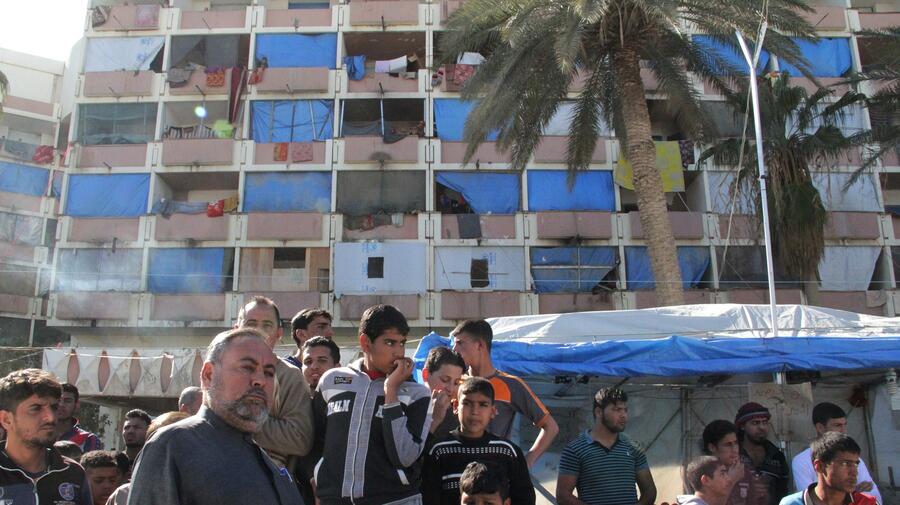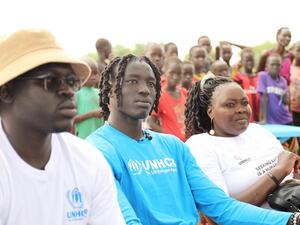No holiday for Iraqis taking refuge in broken tourist complex
No holiday for Iraqis taking refuge in broken tourist complex

Displaced Families at the entrance to the Habbaniyah hotel.
HABBANIYAH TOURIST CITY, Feb 22 (UNHCR) - The six-storey lakeside resort was once the pride of Iraq's tourist industry, popular with holidaymakers seeking a leisurely break boating, fishing and swimming. Then it was caught up in the conflict.
Long since abandoned by tourists, it is now home to hundreds of Iraqis fleeing violence in restive Anbar province and seeking safety in the once swank facility, now marked by empty swimming pools and without power or basic sanitation.
"There is no water here and all my children have started to have skin diseases," said 34-year-old mother of three Asma Margab, who fled to Habbaniyah more than two years ago when her home in Fallujah came under shellfire. "It's a good environment only for germs to be created."
In its heyday, Habbaniyah was considered the largest resort in the Middle East. Habbaniyah Lake stored waters from the Euphrates during the summer and a beautiful complex was built there, with a first class hotel, tourist chalets, swimming pools, sports facilities and elegant restaurants.
The palm-lined hotel underwent major renovation, but work came to a halt in 2013 when Iraq was caught up in violence. Tourists stopped coming. Instead, thousands of people fleeing conflict in Fallujah and Ramadi arrived to take refuge.
Today, around 400 families stay in Habbaniyah hotel. Their stay is by no means luxurious. There is no running water, no mains electricity, and, as the smell attests, no functioning sewage system.
According to an engineering assessment carried out by the local authorities, the building is also in danger of collapse because of its weakened structure, due to the incomplete renovation work.
UNHCR, the UN Refugee Agency, believes the hotel is an unsafe and unhealthy place for families to stay, with a high risk of disease outbreaks. The agency is building stronger shelters nearby to rehouse the families, which should be completed in about one month. There will be proper washing facilities and communal kitchens.
Margab and her husband, 35-year-old Haqi Nasser, rattle off a list of the problems they face in the broken resort. Only one of their three children goes to school. Nasser has no work, and it is hard to find money for food, she says.
"All displaced families here need help," said Nasser. "We are all suffering here in the hotel. Some might have lunch, but there's no money for dinner; or if they have dinner, there's nothing for breakfast. We need help and we want, most of all, peace so we can return home."

Hilal Hadiyah Battal (pink headscarf) with her daughters Sabrin Sabbah, 24, and Malak, 6.
Not far from the hotel, thousands of other displaced families are sheltering in tents, many provided by UNHCR. The agency has upgraded another 700 tents, and provided winter kits, kerosene and relief items for thousands more families.
One family had arrived from Ramadi just ten days earlier. They had been taken by extremist forces and moved "as human shields" to another part of the city as government forces took control of major parts of the city in December. Although the women were eventually released by Iraqi security forces, their husbands and one 16-year-old son, are still being held for security screening.
"Our house was destroyed," said mother-of-seven, Hadiyah Hilal Battal. "We were told we would be executed by extremists if we didn't move with them. Our lives were hopeless."
The psychological trauma of what the family had gone through was still very fresh. "Extremists told us if we go to Europe, they will find us; if we flee to Turkey, they will find us; if we go to Baghdad, they will find us," said Sabrin Sabbah, 24.
"We feel safe here now," said Battal, Sabbah's mother. But asked if they planned to return to Ramadi, Sabbah quickly replied, "100 per cent, yes."
By Caroline Gluck Habbaniyah Tourist City, Iraq








